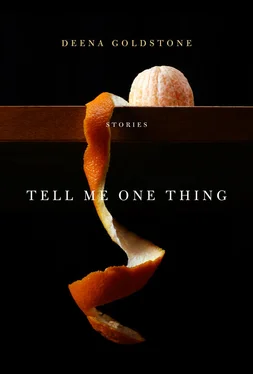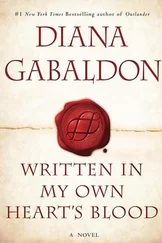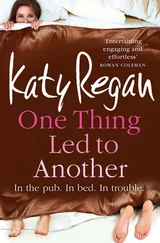By the time she reaches her front door, the sobs have become whimpers and it feels as though her body has cracked open. Everything is shaking — her legs, her hands as she tries to turn the key in the front door lock, her chest as it searches for air.
She manages to make it to the living room easy chair and pull herself into it. And she sits, staring at nothing, waiting for she doesn’t know what. She’s emptied out and stone cold and incapable of forming a thought or action.
She has no idea how long she’s been sitting there when she sees the flatbed truck pull into her driveway and a man she doesn’t recognize begins to wrestle a bulky electric mower down onto the pavement. And then Armando gets out of the driver’s seat and goes to help.
Trudy watches because she doesn’t believe she can stand up and move away from the window. She knows she can be seen, but she also doesn’t have the will to do anything about it.
When the mower is on the grass and the other man has begun the back-and-forth trudging across the lawn with the machine, Armando looks up and sees her in the front window.
The sounds of the two gardeners continue to wash over her — the lawn mower, the tinny scrape of the rake across the brick of the front path, one of them yelling in Spanish to the other. And then it’s quiet and Trudy thinks they may have left, but no, she hears the lawn mower start up again in the backyard and then she hears a loud rapping on the back door. She ignores it. It starts up again.
Armando is standing on the back door stoop, knocking as loudly as he can over the lawn mower’s engine. Maybe she doesn’t hear me , he thinks, over the noise . Maybe he should try the front door, although he always used the back when he needed to ask Mr. Brian something.
Trudy sees him come around the side of the house and take the straight brick path to the front door. He knocks. Waits. Knocks again. He knows she’s there and debates whether he should just leave her alone, but the picture of her sitting there, in that costume, staring at nothing, worries him.
“Mrs. Dugan,” he says loudly as he knocks again, “could I just speak with you for a minute?”
Trudy uses her arms to push her body from the chair. It may be one of the hardest things she’s ever done. Her body feels as if all the bones have drained away and she’s left with flesh that won’t sustain her weight.
“Mrs. Dugan?”
And Trudy opens the front door.
“I’m so sorry to bother you …” Armando starts, waiting for her to say something, but she doesn’t. She doesn’t know how to form the words right now.
“Could you come out into the backyard, please?” he asks.
She nods and closes the door. He waits for her on the back lawn, not at all sure she heard him or that she will come, but no, the back door opens and Trudy walks out, comes over to him where he stands, two square, four-inch plastic pots in his hands.
“This one,” he says, pointing to one pot, “is a Caspian Pink, and the other is something called Eva’s Purple Ball. I plant this one because of my mother. Her name is Eva.” He pronounces it “Ava.”
She looks at him without comprehension.
“They’re tomato seedlings. Heirloom tomatoes that I grow on my kitchen windowsill. Every year I would give Mr. Brian five or six and he would plant them, but I thought, maybe this year, you would want only one or two.”
Trudy raises her hands in a gesture of helplessness. “But I wouldn’t know …”
“I can plant them or I can show you how to plant them. There.” He gestures to the raised beds Brian built so many years ago. “Come,” he says, and he walks to the earth he has already prepared and kneels down, his back to her as it was the first time she saw him through her bedroom window.
“I added compost and tomato food so all you have to do is transfer the plants into the dirt. I’ll show you,” he says, and Trudy finds herself moving toward him and kneeling, in her Story Lady gown, beside Armando.
“This will be simple for you,” he says. “And then you will have some tomatoes in the summer. I thought that if I didn’t bring you some plants, you would have to eat those cardboard ones from the grocery store.”
He digs a small hole in the pliable earth, turns the plastic pot over in his hand, the stem of the seedling sheltered between his first and second fingers so that the plant slips easily from its container. Trudy watches his hands as he lays the plant deeply into the hole and smoothes the earth back around the stem so that only the top leaves are visible.
“They like to be buried deep,” he tells her, “because all along the trunk new roots grow and they make the plant stronger. You would think if so much of the plant is buried under the dirt, it wouldn’t be good, but for tomatoes that’s not true. The deeper you plant them, the stronger they get and the more they blossom. Now, you do the other one so you will know.”
He places the Caspian Pink seedling in her hand. “Turn it over carefully,” he says, “with the stem between your fingers.” She does and the seedling pulls free of the plastic pot. “Good. You have gentle hands. Now into the earth. Deep, and pull up the covers to its chin.” He smiles at her to let her know it’s a small joke.
The dirt feels warm to her touch and damp as she nestles the seedling into the hole Armando has created for it. For the first time she realizes the sun is particularly bright and the day has a wisp of a breeze.
“Perfect,” he tells her, “you will have gorgeous pink tomatoes in July. Lots of them to eat. Now we water.”
He stands and waits for her but she doesn’t move. “Mrs. Dugan?” He places his hand on her back — a soft gesture of concern — and it’s the gentleness of the touch, the warmth of his hand that she can feel through the thin fabric of her dress. Dimly she’s aware that his is the first human touch she’s had since last September 16, the day that Brian died.
She turns to look at him, at the concern on his face, at the goodness she sees in it. She gives him her hand — to steady her as she bunches the flowing gown up around her legs. He takes her hand and helps her up.
THE FIRST TIME CLEMENTINE REALIZED something was up was when Trudy moved the Story Lady to Thursday afternoons from Fridays, where it had been for decades. Clemmie hadn’t been at the library for all those years, only four of them, but Trudy often made a point of reminding her that the Story Lady had been appearing in front of the preschoolers of Sierra Villa for almost as long as Clemmie had been alive, every Friday, three o’clock.
Trudy was nothing if not a model of consistency. Repetition seemed to fuel her soul instead of dampen it. Newness for newness’s sake made no sense to Trudy. Clementine had seen articles of clothing Trudy must have bought well before she even moved to California. They were neat and clean but also thirty years out of style. Trudy didn’t seem to notice. And Clementine knew exactly what she would have said if Clemmie had been foolish enough to point that fact out to her— So what?
Because Trudy had never seen the value of most change and certainly not precipitous change, life, with its appetite for irony, meted out exactly that seismic shift. At least that was Trudy’s bitter reasoning as she trekked through the mire of her particular sadness. Brian, her husband of thirty-two years, went out for his customary run one Thursday morning last September, calling back to her as he always did before he shut the kitchen door that he’d be “back in forty-five,” but this time it wasn’t so. One of their neighbors, Peggy Coopersmith, walking her chocolate Lab before work, found Brian sprawled across Madia Lane. Dead before the paramedics could get there and ascertain that his aorta had ruptured. Dead before Trudy could tell him she loved him one last time. Dead, alone. That last part — that he died without her there to comfort him — never stopped tormenting her.
Читать дальше












